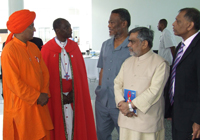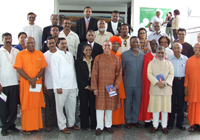
Feature Story
Guyana launches national ‘faith-and-HIV’ coalition
16 December 2008
16 December 2008 16 December 2008 Faith leaders from the Hindu, Christian, Islamic, Rastafarian and Baha’i faiths gathered at the Guyana National "faith-and-hiv" Conference in Georgetown, Guyana, on 11 December 2008.
Faith leaders from the Hindu, Christian, Islamic, Rastafarian and Baha’i faiths gathered at the Guyana National "faith-and-hiv" Conference in Georgetown, Guyana, on 11 December 2008.Credit: UNAIDS
The National AIDS Programme Secretariat of the Ministry of Health in Guyana (NAPS/MOH) convened a National Conference on “faith-and-HIV,” supported by the Joint United Nations Programme on HIV/AIDS (UNAIDS) on 11 December 2008. The aim of the conference was to establish a national coalition of faith leaders of all denominations in Guyana to address HIV-related stigma and discrimination.
At the opening of the 'Guyana National faith-and-HIV Conference', faith leaders from the Hindu, Christian, Islamic, Rastafarian and Baha’i faiths agreed to move from commitment and rhetoric to action, by endorsing the ‘Guyana faith-and-HIV Declaration.’
Through the declaration, faith leaders recognize the need to incorporate appropriate HIV information into their discourses, rituals, religious education, and training of future leaders of faith. They also agreed to safeguard the rights of people living with HIV and affected by HIV, and ensure their complete inclusion in religious, social, familial and economic life.
Furthermore, they pledged to exhort women and their male partners to access formal healthcare, including HIV testing, in recognition of the fact that HIV is a treatable disease and HIV positive parents can have children free from HIV. They also committed to addressing all the vulnerabilities faced by children affected by and living with HIV, especially to ensure that their right to access education, treatment, care, and support in a loving environment is respected.
Finally, they agreed to utilize their places of worship, their educational and health facilities, and their women and youth programmes, to provide the full range of HIV prevention, treatment, care and support services.
During his opening remarks, Health Minister Dr. Leslie Ramsammy emphasized the importance of faith based organizations taking on a more active role in the response to AIDS and pointed to the results of a recent survey which revealed that only 50% of such organizations fully support people living with HIV.

Participants at the Guyana National "faith-and-hiv" Conference, Georgetown, Guyana, 11 December 2008
Credits: UNAIDS
Religious communities, mosques, temples, churches, hospitals and clinics have reached out to provide support to those living with and affected by HIV worldwide. Their leadership has great influence in the lives of many people, and leaders speaking out responsibly about HIV can make a powerful impact at both community and international level. However, the response of the religious community can also be negative. People living with HIV have been stigmatized by some religious leaders and communities of faith. Approaches to HIV prevention methods and attitudes towards people at increased risk of HIV infection such as men who have sex with men, sex workers or injecting drug users have sometimes hindered the response. Much work remains to be done to eradicate HIV-related stigma and discrimination.
Despite goodwill and a commitment to finding ways of working together, there is a gap between good intentions and effective joint action. Misunderstanding of how different faith communities are organized; tolerance and respect of what their followers believe, and how to identify and engage in joint initiatives that transcends organized religion can stand in the way.
The conference was used to guide the discussions through which the faith leadership in Guyana will address the issues of HIV-related stigma and discrimination and how, through the 'Guyana faith-and-HIV Coalition,' a major contribution will be made, in partnership with the National AIDS Programme Secretariat of the Ministry of Health and its partners, to achieve the national targets set towards achieving universal access to HIV prevention, treatment, care and support for all Guyanese, whoever they are, and wherever they are.
“The response to HIV, in any country, is heavily dependent on the broad mobilization of its leaders, institutions and movements. Faith leaders and their communities are present literally everywhere people live their lives - with enormous outreach as well as in-reach. They are important stakeholders in responding to HIV, as they have a strategic advantage in supporting, understanding and accepting people living with HIV, and in playing a crucial role in preventing new HIV infections,” said Dr. Ruben del Prado, UNAIDS Country Coordinator in Guyana.
Faith-based leadership plays an influential role in the efforts to stop the spread of HIV and, as demonstrated in Guyana, this important leadership can be strengthened in partnership with governments, civil society and the international community.
Guyana launches national ‘faith-and-HIV’ coalitio
Feature stories:
Hindu faith leaders commit to AIDS response (18 June 2008)
Developing strategies to work with Faith Based Organizations (10 April 2008)
Publications:
Guyana National Declaration on Faith and HIV (pdf, 112 Kb)



